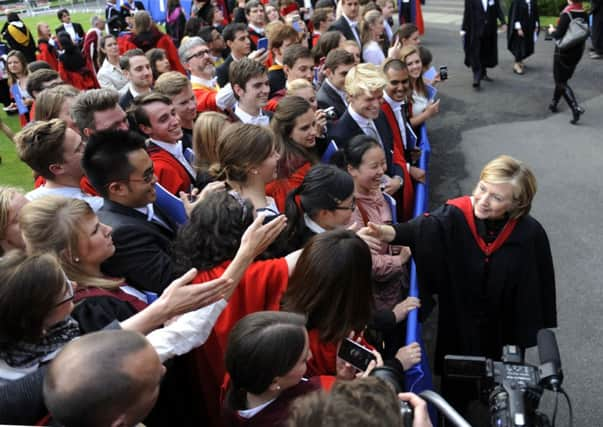Leaders: Listening to others | Hearts’ wonga


Yesterday’s new opinions came from Pope Francis and from former US secretary of state Hilary Clinton. How seriously should Scots treat what they say?
The rival campaigns are subjecting every word to deep textual analysis in an attempt to discover anything which might aid their cause. The Pope’s words, which were certainly not platitudinous, coming as they did in response to a newspaper’s question on the possibility of Catalonia separating from Spain, have been divined by both Yes and No camps to offer succour to them.
Advertisement
Hide AdAdvertisement
Hide AdThis seems a trifle simplistic. What he offered was perspectives to ponder, historical precedents to contemplate, and motivations to consider rather than a clear leaning to one side or the other. And as such, his remarks merit examination by more than just those of the Catholic faith.
As Mrs Clinton recognised, the decision is for Scots and Scots alone to make. This does not, however, mean that all voices outside Scotland should be ignored, or worse, treated with contempt if they happen not to suit a particular view. On the contrary.
As Alex Salmond is fond of noting, today’s world is an interdependent one. The actions of any one country has consequences in other countries and Scotland’s vote, whether it is a Yes or a No, will be no exception. These voices from around the world should be welcomed. Much of the debate so far has been like a family argument in a closed room. Some of it has become unduly bitter, too many ancient grievances, some real and some imagined, are being aired, and degrees of nastiness have crept in.
External voices do more than let a little fresh air into an atmosphere that risks becoming fetid; they are a reminder that the rest of the world can see and hear everything going on and is watching through the window. And the new perspectives they offer from their own experience allow us to re-examine our more dusty assumptions. Scotland’s decision will have a particular impact on the nearest neighbours, the rest of the people in the British Isles. As they will be so affected, they have a right to tell Scots of their fears and hopes. And as they have no vote and will just have to accept the outcome, come what may, they should be listened to with respect.
This isn’t just a matter of politeness. Whether our future is to be – independence, or the constitutional change that all the major parties now recognise must follow a No vote – Scotland will need neighbourly cooperation. Hearing what our neighbours have to say now, on civil terms, is more likely to secure that co-operation than loudly slamming the door on them.
To repeat, the decision on 18 September is ours and ours alone. But it should be a sign of our maturity that we can listen to all and every view before making up our mind.
Soccer shouldn’t be all about wonga
By terminating the shirt sponsorship deal with payday loan company Wonga, Heart of Midlothian FC has taken a good and brave decision. Good, because although Wonga is a legal business, its activities are morally questionable. Brave, because Hearts clearly need the money.
Those who run football clubs have earned a reputation of being more interested in money than their supporters. Bringing in revenue to pay all the necessary bills is clearly important, but so, too, are supporters, because without them, money alone cannot sustain a club. Under the new management of Ann Budge, Hearts have clearly decided that the fans must come first. The time is right for that because the insane arms race of ever fatter player wage bills that took place in the economically good times is over.
Realistic budgets have to be set and kept within.
Advertisement
Hide AdAdvertisement
Hide AdThe cynical might observe that seeking to build an image, and indeed the reality, of being a family football club is nothing much more than a clever marketing strategy and a way of boosting replica strip sales which had sunk because of parental worries about children wearing the Wonga logo. But the decision to have next season’s home strip devoid of advertising in honour of the 1914-15 team that signed up to fight in the First World War should give the lie to that.
And even if it is good marketing, there is nothing wrong with that if it brings more supporter families through the turnstiles. More interesting still is whether Hearts will set an example that other clubs feel obliged to follow. Should children be running adverts for big drinks or gambling firms? Are these things that sport should be promoting?